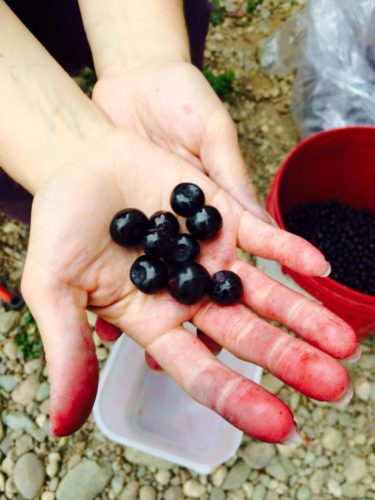My experience at the Unist’ot’en Camp has always been a positive and empowering one.
We visited the Unist’ot’en Camp on several different occasions. We were first invited up to the camp in 2013. The experience left me with a feeling of hope and strength. It was good to see how the Unist’ot’en members were committed to protecting the land, the water and their family’s way of life. I loved getting to the checkpoint and witnessing the way Warner and Freda guided us through the protocol. It was such a respectful way to remind us that we were on their traditional territory and that they had expectations of us to be mindful and share the beauty of their territory.
On our first visit, we were shown around. We got to see the hard work that went into building the permaculture garden, the early stages of the pithouse, the greenhouses and the small smoke house. It gave me a glimpse of the history of the people and how important it was to keep the land protected.
We continued to eat a traditional meal with Freda and company before singing some traditional songs. It was only a day visit, but it was comforting to go back to the territory and have such a loving visit. The second visit was to witness the action camp.
During our day visit, we got to see the progression of the pithouse and enjoy fresh food from the territory. Many people spoke of the importance of the land and water to our people. The camp was now filled with more people, some Wetsuwet’en and some supporters of the Unist’ot’en.
I loved to see the community that developed over a few months. It was also uplifting to see so many more Wetsuwet’en traveling up there to be with their family. Again, we sang and danced and listened to the elders talk about the land and the importance of protecting it. Many traditional stories were shared. Both my children were able to come out to the camp with me and beautiful Aunts. We all left there satisfied and empowered to witness the love and passion that the Unist’ot’en had for their territory, animals, water and each other.
My children, Sy and Sim Wilson, both spoke of how it made them want to cry when we left. They quickly became connected with the land and the people. This experience helped them to have a sense of belonging and was another stepping stone in learning more of the Wetsuwet’en traditional ways. They were very inquisitive.
My experience at the Unist’ot’en Camp has always been a positive and empowering one.
The third visit that we had was to visit with our little niece, Jamie Lee, who had gone to live with Warner and Freda. They went above and beyond to include her in their daily lives. They had to build her a safety exit of the cabin, they provided her with traditional foods to eat and help preserve, in addition to showing her how to live in a simple manner. She struggled living in many homes previous to her stay at the Unist’ot’en Camp. She was considered a behavioral child and unfortunately, many people were unable to cope with the behaviors. The camp helped her to see life from a different perspective. The changes that were most notable included: less talking back, respect for adults, engaging more positively with others, and wanting to include herself with daily activities. She was very proud to construct a bow, to help process a deer, to swim in the river and go for walks. She was always very excited to show us around the camp. Jamie adapted to her new home but she had a hard time accepting that she would have to home school and moved back to Smithers.
Our last few visits to the Unist’ot’en camp were day drives that my children organized. They brought some of their friends up there to see the camp. They wanted them to see the beauty of the land, the water and the people. Both times we were there, we missed seeing Warner and Freda, but we were still allowed to visit. Our companions were mystified at the feeling of contentment they had.
One discussion on the way home was full of laughter and pure joy. When we stopped at the river, my daughter’s friend Amanda said that she would love to live out there. She spoke of the beauty and the power that the land had. We again, all had a brief cry because we had to go home.
Overall, the visits that we had to the Unist’ot’en Camp left us with a feeling of happiness. It was a stress relief leaving the Western world and experiencing such a meaningful way of life. It taught us the value of the land, the people, water and our future generations.
I mostly love how it uplifted our spirits to see how our people are regaining their identities and rebuilding themselves, their families and community by preserving our way of life. It is empowering to go to our land and feel like we belong to such a strong nation.
words: Lillian Wilson



